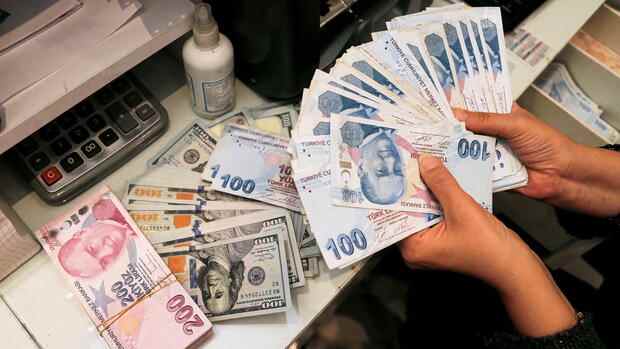Istanbul The news came as a surprise: At the beginning of August, the Turkish central bank reported that monetary reserves had risen by 7.4 billion to 109 billion US dollars within a week. The amazing thing about it: It wasn’t just the highest increase in the past twelve months. The inflow was also surprising because the currency reserves are actually shrinking at the moment, as the Turkish state has to pay off debts or is supporting the domestic currency. The lira has lost a quarter of its value since the beginning of the year.
The background to the unexpected windfall is largely a one-off payment from Russia. It was announced last week that Russian state-owned nuclear power plant operator Rosatom would transfer $15 billion to a Turkey-based subsidiary to build a $20 billion nuclear power plant on Turkey’s Mediterranean coast. Since then, Turkish Finance Minister Nureddin Nebati has spoken of “heavy transfers from abroad”.
However, this will not solve the problems for the Turkish lira; on the contrary, they are likely to worsen in the autumn. On the one hand, this is due to circumstances that even the Turkish head of state Recep Tayyip Erdogan cannot do much about. The prices for energy sources such as natural gas will remain high and will probably rise further towards the winter. So energy has to be bought abroad in dollars, which means that further foreign exchange reserves will flow out.
On the other hand, it is the Turkish President’s expansive monetary policy that makes such imports even more expensive because the lira continues to weaken as a result. This can also be seen in the state balance sheets: In the spring, for example, Turkey had to transfer almost one billion dollars to the state energy importer Botas so that the latter could shoulder the increased energy prices.
Top jobs of the day
Find the best jobs now and
be notified by email.
And this is where the problems of the coming months begin. Because it is becoming more and more expensive to finance Ankara’s loose economic policy.
The analysts of the Turkish analysis company Oyak Securities see a “visible weakness in the financing” of the state budget. About $2.4 billion flowed out of the country monthly, while the government used $2 billion of central bank reserves to balance current account and capital deficits.
Inflation could peak soon
Around $950 million in foreign direct investment flowed into the country in June, with the main source of the inflow being so-called “hot money flows” such as deposits from foreigners. “Apart from that, fragility prevailed in the capital structure in June,” summarize the Oyak analysts. “We expect this weakness and depletion of reserves to continue in the coming months as alternative capital inflows are scarce.”
Some indicators at least convey a slight relief. Annual consumer price inflation rose from 78.6 to 79.4 percent between June and July – an exceptionally high figure worldwide. But inflation appears to be peaking, after which it could fall again.
Meanwhile, the Istanbul stock index ISE100 has risen by 45 percent since the beginning of the year, roughly as much as consumer prices over the same period. This shows that the real economy in Turkey has not come to a standstill.
The latest quarterly figures from Turkish companies confirm this. In the financial sector in particular, this can be seen in the business figures. The private money house Garanti Bankasi increased its net profit between April and July by 341 percent compared to the previous year, Yapi Kredi Bankasi by 434 percent and Akbank by 523 percent.
At the cement manufacturer Akcansa, net profit rose by 237 percent, around three times faster than consumer prices. At the German-Turkish joint venture Enerjisa, net profits increased by 124 percent in the second quarter. In other words: Erdogan’s economic policy massively weakens the lira, but it creates profits.
And it rubs off on the foreign policy of the authoritarian head of state. In the Russian war of aggression against Ukraine, Turkey is supporting Kyiv with highly effective combat drones and at least 50 armored vehicles. At the same time, Ankara is not imposing sanctions on the Kremlin. On the contrary: Russian tourists can still travel to Turkey, even those with their own yacht. A new Turkish charter airline was even launched that is not affected by sanctions.
Turkish lira: companies brace themselves for further decline
All of this doesn’t seem to do much good for the lira. The Turkish currency has been trading at the psychologically important threshold of 18 lira per dollar for several days. Analysts believe that if this level is breached, investors will start a sell-off that will be unstoppable.
According to official figures, Turkish companies increased their dollar deposits in Turkish banks by 5.6 billion dollars within a week. In this way, they protect their income and savings from a further fall in the lira. Fatih Akcelik, an emerging market economist at Deutsche Bank, suspects that the pressure on the lira is likely to continue for another reason: debt repayments.
From September, the Turkish state, banks and companies will have to pay off six to seven billion dollars in foreign debts every month. For comparison: According to the bank’s estimates, it was around three billion dollars for the month of August, and in July it was almost four billion.
“Therefore, we expect that the pressure on the lira will be greatest in the last months of the year,” analyzes Akcelik. Recent foreign direct investment inflows and a significant slowdown in credit growth would help the lira in the short term. “However, we expect that they will only slow down the depreciation.”
More: Why the EU doesn’t want a dispute with Erdogan
